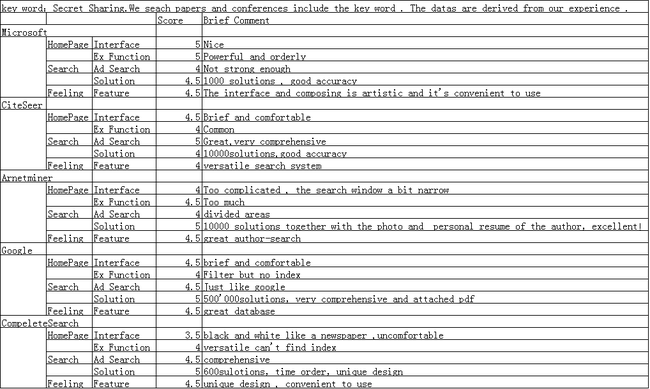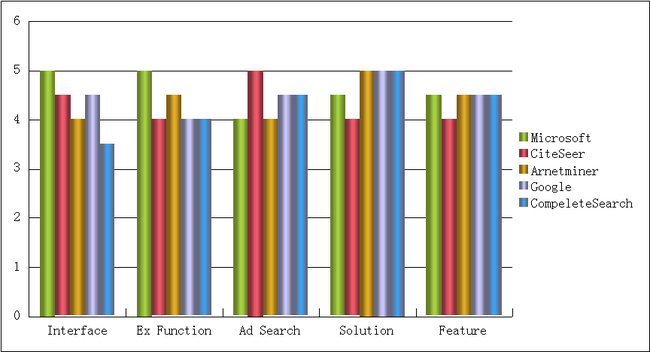homework3
The first two are competitors.
DBLP: http://www.informatik.uni-trier.de/~ley/db
Google scholar: http://scholar.google.com/
Academic Search: http://academic.research.microsoft.com/
For simplicity, I'm going to have some comparisons among these three.
1. Google Scholar
follows Google's rule:simple interface
search the names of people and the articles in a single search box
2. DBLP
According to the year, it list an author's articles and published works
Being able to click to see Bibtex, useful to other authors.
3. Academic
According to the author, articles, search the conference and journal papers published by the author(which is absent in the first two)
According to the co-author relation of the author, provide the relation graph
Provide RSS subscribe.
Give top articles, authors in every field.
Draw back: lack of Bibtex
When I use the academic search engine, I mainly search the article. By the way, I may look at how well the author publish articles.
Surely, from time to time, I want to know more, such as co-authors, so 1&2 satify most of my needs. Since I'm used to the above two, I use Microsoft Academic Search much less. I wonder whether Academic has the statistics of how many users really use the RSS subscribe provided. Maybe it's not useful after all for a search engine.
In contrast to the color and style of DBLP, Academic has characters more fashioned, color design more fancy. This might be uncomfortable for users who prefer simplicity. If the user can choose the design of the webpage, characters, and etc, perhaps users will be more satisfied. In addtion, quite often, there's repetition of an author's name. Perhaps it's better to list each author's articles seperately.
There are at least three user needs out there which isn’t satisfied by existing services. First, to understand an article that has been searched, the user might need to see the reference, in the same time, he might also want to see some basic tutorial. Secondly, it's will be useful to list all things needed to understand the article. Specially for beginners. Thirdly, when given a specific field, the users want to know about which universities are good at it, which good courses about it, videos on the internet about it and so on. It will help the people who want to dive more deeply.
Here is a list:
Attachment:
Use the paper "Solutions of a Problem in Concurrent Programming Control"
Fundmental features that users need
1. When one knows (almost) the exact title of a paper, the search engine must find them. (Mendeley, CiteSeer failed)
2. Link to download
Additional features that some users need
1. Bibtex of a paper should be ready with only one click on the page. (Most failed, ArnetMiner had)
Exciting features that may impress users
1. Closely releated papers have a high rank (Google did very well)
2. Author's homepage and his scholastic genealogy (ArnetMiner did very well).

